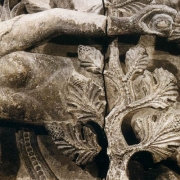This is a tale of testicles, fertility, the length of men’s hair, and one bizarre tweet
This article originally appeared on January 24, 2022 at Baptist News Global.
Owen Strachan woke up on Martin Luther King Jr. Day with decades of injustice weighing heavily on his mind: Men with long hair.
Strachan, who is former president of the Council on Biblical Manhood and Womanhood and is now provost and research professor of theology at Grace Bible Theological Seminary, tweeted, “Men: cut the man bun. Lop it off. Time to look like a man. No one wants to say this in an androgynous age, but in obedience to God, do it. No perfect length, but cut that hair down your back. And hand that Scrunchie back to your little sister. Look manly. God’s glory is in it!”
 He added a screenshot of 1 Corinthians 11:14-15, which says that nature teaches it’s a disgrace for men to have long hair.
He added a screenshot of 1 Corinthians 11:14-15, which says that nature teaches it’s a disgrace for men to have long hair.
Like many evangelicals, the Theobros believe every sin must be punished at the Cross or in hell. So at what millimeter of hair length does God go from being totally fine to being so angry that either Jesus had to be crucified or someone must burn forever over it? And what kind of God needs glory by humans having certain haircuts?
The entire debate about hair length is absurd. And most Christians today understand that. Michael Bird, academic dean and lecturer in New Testament at Ridley College, responded: “Sweet Mother of Melchizedek, just how can Strachan say this nonsense with a straight face? It’s like he’s trying to impersonate John MacArthur and the Dos Equis Most Interesting Man … at the same time.”
After yet another head scratching controversy involving Strachan, Beth Moore, the Southern Baptist Bible teacher turned Anglican, tweeted: “Shoulda stuck with pony tails.”
In any case, this conversation ultimately isn’t about hair length. It’s about how we approach the Bible. It has massive implications for how we view inerrancy. And, despite our many differences, Strachan would agree with that.

Owen Strachan
He said as much when he doubled down the next day, tweeting, “Paul: long hair is a ‘disgrace’ for a man (1 Cor. 11:14). Do people still read, believe, and apply the Bible?”
Scientific inerrancy is about more than creation and the flood
According to the Chicago Statement on Biblical Inerrancy, inerrantists “deny that biblical infallibility and inerrancy are limited to spiritual, religious or redemptive themes, exclusive of assertions in the fields of history and science,” and “deny that scientific hypotheses about earth history may properly be used to overturn the teaching of Scripture on creation and the flood.”
It would appear that inerrantists believe that whatever the Bible says in fields of science must be taken as completely true directly from the mouth of God.
When we think about science and the Bible, we tend to focus on creation and the flood, just as the Chicago Statement does. But there are many more science-related conversations in the Bible than those two issues. And when it comes to Paul’s teaching about nature and hair, there is a lot to untangle.









Leave a Reply
Want to join the discussion?Feel free to contribute!